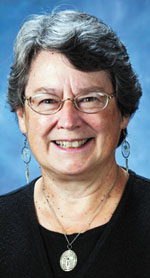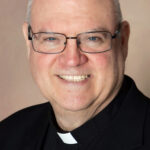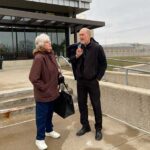By Corinne Winter
On Aug. 27 the liturgical calendar lists the memorial of St. Monica and on Aug. 28 that of her son, St. Augustine. Having been in Catholic schools most of my life, I heard a great deal about St. Augustine, patron of theologians (as well as brewers, printers and sore eyes). We were encouraged to follow his example of dedication to study and to the church. When we were considered mature enough to hear about his less exemplary early life, we were told how his search for the truth led him to Catholicism. Once in a while we heard mention of his mother who, we were told, prayed tirelessly for his conversion until it occurred. Only quite recently did I find the story that St. Monica too needed and underwent a conversion during her adult life. She apparently had taken to drinking too much wine but stopped doing so after being challenged on it. For that reason, she is listed as patron of alcoholics. It is these stories of conversion as well as of the search for truth that, I believe, call to us today. Recent news has demonstrated beyond question that the world and the church itself stand in desperate need of conversion.

We need conversion from violence, to find peaceful and respectful ways to deal with one another. We need to learn to recognize and address tensions before they reach explosive levels, and to recognize every person as created by God with inalienable dignity and a potential for good, a foundational conviction for Catholic social teaching found most recently in Pope Francis’ condemnation of capital punishment.
We need conversion from the thirst for power over others, which psychologists tell us is the root of predatory sexual behavior as well as of other forms of violence and bullying. That disordered thirst also leads to unjust economic structures as accumulation of wealth leads not only to purchasing power but to undue influence in many other areas such as politics. Again, Catholic teaching tells us that we are made for community and will find our own well-being only through the pursuit of the common good.
Within the church, we need to examine our internal application of the principle of the common good and establish universally the conviction that “protecting the church” means protecting the most vulnerable. We need to raise the fear of harming others far above the fear of lost reputation or influence. And we need to be willing to accept counsel and assistance.
We also need conversion from grasping for simple or convenient answers. Every time the issue of abuse by some priests comes up in the news, a few people begin to ask about abolishing celibacy for priests. While the requirement for celibacy can certainly be discussed for other reasons, evidence shows that abolishing it will not bring an end to the abuse. Nor will denying ordination to all who have a homosexual orientation. The issue is much deeper than either of those. We need to continue to study, to pursue the wisdom that will help us support and sustain right relationships among all members of the church.
Likewise, the fact that the perpetrator of one heinous crime was an immigrant from a certain country does not mean that strengthening our borders is the solution or even part of the solution to crime in the United States. The total lack of logic in fearing much less trying to eliminate whole groups of people when one member of the group commits a crime is easy to see and to reject. We need to acknowledge and address the multiple and complex factors that lead some people to criminal activity.
The list of a few areas in which we need conversion may tempt us to give up with a despairing shrug and the assertion that humanity is going you-know-where in a hand basket. But we can’t do that. Hope is one of the three theological virtues we are called to exhibit in our lives. And it means more than hoping that we, as individuals, will one day experience heaven. It means hope for all of creation. It means continuing to seek the truth and the right no matter how many failures we have. St. Monica is sometimes held up as a model of perseverance in prayer and in seeking to influence Augustine. May she add her prayers to ours.
(Corinne Winter is a professor-emeritus of St. Ambrose University, Davenport.)











